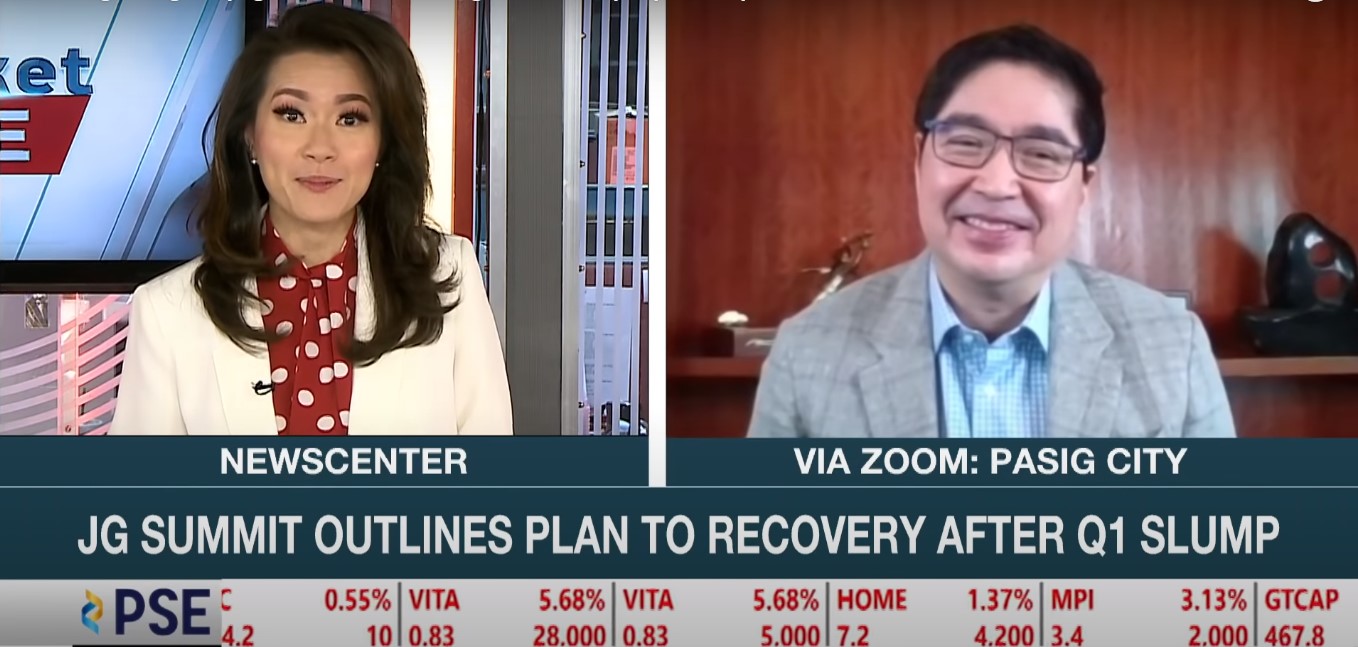In a recent interview on the ANC program Market Edge with Cathy Yang, JG Summit President and CEO Lance Y. Gokongwei shed light on a number of pressing issues, dominated by discussions on COVID-19’s effects on the conglomerate’s business operations.
In assessing the impact that the global pandemic has had on JG Summit, Gokongwei stated this will be revealed in the financial figures for second quarter of 2020, due to declines in consumer goods spending, retail sales, hotel accommodations, aviation services, and other businesses caused primarily by government-imposed social distancing measures. “A lot of consumers are staying at home and probably are more conscious about being more thrifty and saving their money for essential items at this point,” said Gokongwei.

JG Summit Holdings President and CEO Lance Y. Gokongwei during the interview with ANC's Cathy Yang on June 15, 2020. Screenshot of ANC video by jgsummit.com.ph
Despite the obvious challenges, ANC anchor Cathy Yang pointed out that JGS’ stock price has already recovered significantly since the early days of the pandemic, turning into one of the biggest gainers in the previous weeks. Asked about the cause of the gains, Gokongwei said, “I think the market recognizes that the effects of COVID are probably shorter term. I think markets tend to look ahead, a couple of years ahead, and they do recognize that JG Summit is really a diversified business, full of strong business leaders.”
Among the conglomerate’s strengths, he added, was the customer-centric nature of the company and the ability to adjust to shifting consumer demand. This, said Gokongwei, allows JG Summit to be “well-positioned to benefit from the so-called new normal and the return of the economic growth for this country.”
The conglomerate’s digital transformation efforts, which had gotten underway long before the COVID-19 crisis, also helped shape the agile culture now in place throughout JG Summit. As the opportunity presented itself, various business units were able to adapt quickly, rolling out digital platforms to serve the public. “The COVID crisis has just merely accelerated and reinforced what we have to do,” said Gokongwei. “We just have to move in a quicker manner and just dive head on. There’s no other way about it.”
Citing examples of JG Summit’s push towards digital, Gokongwei mentioned the e-commerce sites of Southstar Drug (southstardrug.com.ph) and Robinsons Supermarket (gorobinsons.ph); URC offering its products on the LazMart website; Robinsons Bank allowing new customers to open accounts online through the RBank Sign-Up app; and Cebu Pacific making the entire customer journey contactless. “In each of our businesses, we have had to demonstrate the capability to move with agility and force in order to address the changing consumer behavior and the different channel behavior,” explained Gokongwei.
With the slowdown in global and domestic travel during the crisis, the conglomerate’s airline, Cebu Pacific experienced the most significant drop in revenue. “Today we're only basically flying at about 2% of our previous capacity,” said Gokongwei. This figure, however, is slated to rise as nationwide quarantine measures are slowly being relaxed. For Cebu Pacific, the quick recovery of losses is not the main concern. “Our foremost priority as an airline is to ensure that our employees and our passengers are offered a safe way to travel. We're putting in all the necessary steps in terms of contactless travel, from the process of booking all the way to check in, to the flights. We're ensuring that the absolute highest safety standards are imposed following international rules set up by the International Civil Aviation Organization.”
The next step, Gokongwei says, is to reassure its partners in government and the LGUs were Cebu Pacific operates that it is prepared to support safe and convenient travel.
“By the end of the month, we intend to be flying to about 20 domestic cities. With about 21 routes primarily out of hubs in Manila and Clark. We'll start with that first, and we'll see how the demand goes. By the end of the month, we hope to be at about 10 to 15% of our previous schedules.”
Gokongwei himself cannot wait to get back in the air, concluding the interview by saying, “I'm going to hop on the first flight I can.”
The interview can be viewed in full here:


